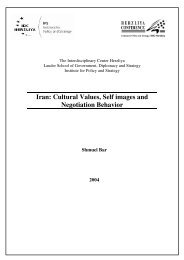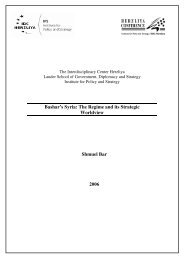Classical Islamic Paradigms of Deterrence and their Expression in ...
Classical Islamic Paradigms of Deterrence and their Expression in ...
Classical Islamic Paradigms of Deterrence and their Expression in ...
Create successful ePaper yourself
Turn your PDF publications into a flip-book with our unique Google optimized e-Paper software.
out <strong>of</strong> truly meditat<strong>in</strong>g the mean<strong>in</strong>g <strong>of</strong> these <strong>and</strong> similar <strong>in</strong>junctions for Muslim culture, which read evenclearer <strong>in</strong> <strong>their</strong> entirety (similar to Jewish <strong>and</strong> Christian fundamentalist <strong>in</strong>junctions on faith). 64 Khauf is thusa more general <strong>and</strong> abstract concept <strong>of</strong> fear to observe God’s comm<strong>and</strong>s, while ittiqa' signifies a moreconcrete concept <strong>of</strong> fear from God, i.e. his <strong>in</strong>junctions must be fearfully observed, otherwise concretepenalties will eventuate. This concept is called "the fearful observance <strong>of</strong> His services (<strong>of</strong> faith)." Bothconcepts <strong>of</strong> fear concern Muslim <strong>in</strong>ternal psychology, not the fear levered aga<strong>in</strong>st non-Muslimadversaries. 65 As I argued before, this knowledge should not be abused by Western policy makers aga<strong>in</strong>stthe majority <strong>of</strong> peaceful Muslims. However, political realism at times requires the deterrence <strong>of</strong> Muslimextremists. This can be a precondition for non-military political strategies towards other Muslims as well.Secondly, there are <strong>Islamic</strong> terms for states <strong>of</strong> m<strong>in</strong>d which signify the <strong>in</strong>ternal abstract fears <strong>and</strong> externalconcrete frights <strong>of</strong> enemies. "Terroriz<strong>in</strong>g fright" as a deterrence by punishment strategy is thrown aga<strong>in</strong>stthe opponent <strong>in</strong> a concrete sense by suicide attacks ('amaliyat istishhadiyya) or classical assass<strong>in</strong>ations(ightiyalat), as well as <strong>in</strong> an abstract sense. The abstract concept ra'b appears five times <strong>in</strong> the Qur'an. 66 Itdescribes a feel<strong>in</strong>g <strong>of</strong> paralyzed powerlessness; a psychological destruction that conquers the enemy’sm<strong>in</strong>d. For example, adversaries are struck with a terroriz<strong>in</strong>g feel<strong>in</strong>g <strong>of</strong> fear when they turn aga<strong>in</strong>st Islam. Incontrast, the concept rahab has a concrete mean<strong>in</strong>g. The simple transitive verb rahab means to fear God<strong>and</strong> especially the fulfillment <strong>of</strong> agreements which believers have reached with Him. 67 The fourth formderivate <strong>of</strong> this verb, arhaba, means "to cause terroriz<strong>in</strong>g fright" <strong>in</strong> the enemy’s m<strong>in</strong>d. The Englishtranslation <strong>of</strong> its related noun irhab is "terror." The most prom<strong>in</strong>ent Qur'an <strong>in</strong>junction is: "Aga<strong>in</strong>st themmake ready your strength to the utmost <strong>of</strong> your power, <strong>in</strong>clud<strong>in</strong>g steeds <strong>of</strong> war, to strike terror <strong>in</strong>to (thehearts <strong>of</strong>) [turhibuna] the enemies <strong>of</strong> Allah." 68 This <strong>in</strong>junction is <strong>of</strong>ten used very selectively by jihadiideologues, for example, to prove that "terrorism" is a legitimate concept (Abd al-Qadir b<strong>in</strong> Abd al-Aziz, AbuMusab al-Suri).F<strong>in</strong>ally, <strong>Islamic</strong> deterrence strategy is based on a synthesis <strong>of</strong> the different fear concepts. Muslims aresupposed to feel a general fear to observe God’s comm<strong>and</strong>s (khauf) <strong>and</strong> to feel awe from div<strong>in</strong>epunishment if they do not give support to deterrence (ittiqa'), which takes the the form <strong>of</strong> terrorist attacks.A threat scenario must be created to deter the enemy (ra'b; irhab). <strong>Islamic</strong> deterrence itself is called rad'.This term does not appear <strong>in</strong> the Qur'an, but <strong>in</strong> later texts, which were narrated <strong>and</strong> subsequently writtendown as <strong>Islamic</strong> traditions (The Sunna <strong>and</strong> its literary form hadith), as well as medieval <strong>and</strong> modern legal<strong>in</strong>terpretations. Modern jihadi ideologues have condensed this concept <strong>in</strong>to a deterrence by punishmentstrategy, call<strong>in</strong>g it "terrorist deterrence" (istiratijiyat al-rad' bi-l-irhab) to be discussed <strong>in</strong> detail below (part7.a <strong>of</strong> this paper).64 Qur'an, Surat al-Baqara 2:2-7: This is the Book; <strong>in</strong> it is guidance sure, without doubt, to those who fear Allah; Who believe <strong>in</strong> the Unseen,are steadfast <strong>in</strong> prayer, <strong>and</strong> spend out <strong>of</strong> what We have provided for them; And who believe <strong>in</strong> the Revelation sent to thee, <strong>and</strong> sent beforethy time, <strong>and</strong> (<strong>in</strong> <strong>their</strong> hearts) have the assurance <strong>of</strong> the Hereafter. They are on (true) guidance, from <strong>their</strong> Lord, <strong>and</strong> it is these who willprosper. As to those who reject Faith, it is the same to them whether thou warn them or do not warn them; they will not believe. Allah hathset a seal on <strong>their</strong> hearts <strong>and</strong> on <strong>their</strong> hear<strong>in</strong>g, <strong>and</strong> on <strong>their</strong> eyes is a veil; great is the penalty they (<strong>in</strong>cur).65 "Khashiya" has a similar concrete mean<strong>in</strong>g <strong>of</strong> fear <strong>and</strong> is used like "ittiqa'".خَشْيَةَ 17:100, see also Surat al-Isra االله 2:74, See Qur'an, Surat al-Baqara66 Verses Al-Imran 3:151; al-Anfal 8:12; al-Kahf 18:18; al-Ahzab 33:26, al-Hashr 59:2.67 Exact stipulations are connected to this concept <strong>of</strong> terroriz<strong>in</strong>g fright. Either it is understood reflexively, i.e. terroriz<strong>in</strong>g fear fromsometh<strong>in</strong>g, or caus<strong>in</strong>g, i.e. to <strong>in</strong>still terroriz<strong>in</strong>g fear. See Verses al-Baqara 2:40 <strong>and</strong> al-Nahl 16:51.68 Surat al-Anfal 8:60.خَشْيَةِ20
















